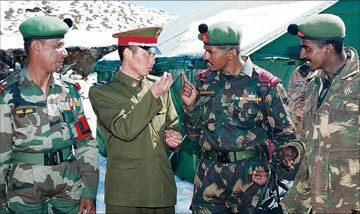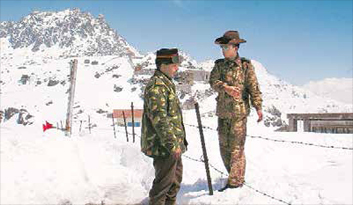Both our western and eastern borders have got turbulent, thanks to Pakistan’s persistent trouble on the one hand and China’s expansionist aspirations on the other. It is imperative that we use all our weapons wisely-be they diplomacy, military or economic
The expansionist policy of China is fully visible in the South China Sea where it is artificially creating islands, making use of reefs and atolls. Army and air force bases have been created on such newly built islands. The objective behind such an exercise is to have control over the economic zones of other neighbouring countries

Our Western Front has been turbulent for quite some time now, due to increased infiltration and the sound of mortars and guns. The LOC has been violated almost on a daily basis by Pakistan, a country whose only objective for its existence is to give us a thousand cuts. We are replying in equal measure but we cannot stoop as low as our neighbour.
The new problem at our North-Eastern border has been created by China, which has been Pakistan’s mentor for commercial and strategic reasons. The exact spot of the problem is the tri-junction area of India, Bhutan and China touching Doklam plateau. The tri-junction is near Siliguri and the narrow area connecting the two is called Chicken’s Neck. If an enemy nation controls the Tri-junction, it will be a serious security threat to us, as our all north-eastern states can get disconnected just by taking over the narrow lane leading to Siliguri.
The Chinese army has reached the strategic point with road building machinery as they want to link this point with mainland China, so as to enable them to reach their battle tanks and war equipment quickly if the situation so demands. Our army has promptly responded by stopping the Chinese intrusion. The armies of the two countries are standing at the tri-junction with eyeball to eyeball contact.
The situation does not stop here as it has been vitiated by threats of war. The official Chinese media has alleged that India is the intruder in their territory and that they will be constrained to wage war unless the Indian army withdraws. In technical terms, the Doklam plateau belongs to Bhutan and since 1890, the status-quo at the border between China and Bhutan has been maintained, though China has claimed it to be disputed territory. Bhutan has a defence agreement with India to safeguard its territory. There is also a three-party agreement between India, China and Bhutan to maintain the status-quo at the tri-junction. Bhutan has also voiced its concern along with India at the movement of troops by China to the tri-junction area of Doklam for constructing a road. China has kept quiet on the opposition raised by Bhutan so as not to be seen as bullying a small country and thus protecting its image in the international community.
With India, China has kept the issue at a high pitch by threats of war and reminding us of 1962 when we lost the war against them. On the contrary, India has shown maturity and avoided getting into any verbal duel with China. The government has made a statement in the Parliament that India is on correct ground and that the international community is with us. The government has also assured that we are competent to protect our strategic interests and our border, if such a need arises and that it is 2017 and not 1962.
The official newspaper in China, in its editorial, has said that Indo-Sino relationship is getting spoiled due to the rise of Hindu nationalism in India after 2014, when a new government was elected. China is playing the Pakistani card by putting a wedge in our society.
India has shown maturity and avoided gett ing into any verbal duel with China. The government has made a statement in the Parliament that India is on correct ground and that the international community is with us. The government has also assured that we are competent to protect our strategic interests

Our relationship with China was excellent in ancient times. Buddhism travelled to China from our country, as there was an exchange of scholars. There was also active trade between us through the trade route called the ‘Silk Route’. During the British reign in India, ‘pushed trade’ of opium from India to China led to the infamous Opium Wars. During the Second World War, our Indian soldiers were deputed to fight alongside China against the Japanese intrusion in China. China became independent on October 1, 1948 and India was amongst the first few countries to recognise the Peoples Republic of China (now mainland China) after dissociating itself from the Republic of China (Taiwan). India and China entered into a friendship Treaty of Panchsheel and coined the slogan, ‘India-China Bhai-Bhai’.
The situation deteriorated when China invaded Tibet in 1959 with the sole objective of annexing it, and thus removing a buffer state of peaceful and religious people between us. Respecting the friendship Treaty of Panchsheel, India chose not to interfere when Tibet was getting annexed, but on a humanitarian ground the Dalai Lama was given asylum in India. China did not like it and our relationship started getting sour and the same resulted in war in 1962. Pakistan tried to fish in the troubled waters and a part of our territory illegally occupied in Gilgit-Baltistan by it was handed over to China to ink a permanent friendship with China against a common foe that was India. Border disputes with China continued to remain, but there were no fireworks except for some minor skirmishes.
Our bilateral trade meanwhile, developed and as on today, China is our biggest trading partner. However, the trade with us is lopsided to the full advantage of China. Out of an approximate bilateral trade of RS. 4.5 lakh crores, the export by China to us is of RS. 4 lakh crores and our export to China is a small- RS. 50 thousand crores, resulting in a trade deficit against us of RS. 4 lakh crores. We mainly export raw materials, while China exports finished goods.
China’s friendship with Pakistan has kept on growing. Recently, there has been a $46 billion agreement between China and Pakistan for developing CPEC (China Pakistan Economic Corridor) from our illegally acquired territory in Gilgit-Baltistan to Gwadar Port in Balochistan. This work is going on in full swing and the same is the case with the flagship component of OBOR (One Belt One Road) which has been much advertised by China. Many countries and heads of states attended the launching ceremony of OBOR in Beijing which India decided to abstain as OBOR violated the sovereignty of India since CPEC was in our illegally occupied area. China criticised India on our stand on OBOR but it also realised that without the support from India OBOR will lose its shine. The Doklam problem has now happened in quick succession of our stand on CPEC and OBOR.
China is a big country with sizeable economic power but it follows an expansionist policy. The kings of ancient China believed that their country was ordained by heaven to dominate the world. The mindset of the old times dominates China even today in the modern world. China is the fourth largest country in the world in area and the largest in terms of population. However, it has an unsuppressed appetite to have more parts of the world under its control. Smaller countries near its border are its automatic targets. Tibet has already been annexed and the next target may be Bhutan, Nepal or even Vietnam. Pakistan may also be under its radar after 20 years when the CPEC becomes fully functional with a defence base at Gwadar Port.
The expansionist policy of China is fully visible in the South China Sea where it is artificially creating islands, making use of reefs and atolls. Army and air force bases have been created on such newly built islands. The objective behind such an exercise is to have control over the economic zones of other neighbouring countries as the South China Sea is believed to have untapped mineral wealth and vast fishing potential. By controlling the South China Sea, it wants to control the commercial navigation through this corridor. Once the sea is conquered, there may be an attempt to conquer adjoining land of other countries. The international community is concerned over these happenings.
China follows the policy of economic subjugation where physical control is not possible. This policy has two limbs. The first is to give loans to weaker countries but keeping control over investment in the borrowing countries. China tries to see that investment is implemented in the borrowing countries through its material and manpower to have a market for its material and employment for its citizens at the cost of the host country, as the host country has to pay interest to China. This becomes a win-win situation for China, while the loan taking country gets economically subjugated, as servicing the loan becomes difficult. The example of this is the construction of the deep sea Hambantota Port in Sri Lanka by China. The port will add to the economic burden of Sri Lanka though initially the project might have looked rosy. Similar is the situation of China’s investment in Africa where big money is being pumped in, but Africans are gradually understanding that it is meant for looting the natural resources of Africa. It is a form of neo-colonialism. Similar funds have been given to Nepal and Bangladesh. Pakistan is a similar case but it is unique in the sense that it is fast moving towards becoming a colony of China as per media reports in Pakistan, which say that CPEC is good for China and not for Pakistan.
The second limb of the China economic policy is to have huge trade deficits against countries importing from China. In this, the biggest victim is USA. The US trade deficit with China in 2016 was $347 billion. The import from China by US is $463 billion, while exports by it to China is only $116 billion. To help its export, China keeps its currency undervalued. China is in a position to blackmail US, as it holds the debit security of US in a big way. Our country is also a victim of a severe trade deficit with China.

The present action of China at Doklam and its partnership with Pakistan for creating problems for us is in accordance with a well scripted game plan. China knows that India is the fastest growing major economy, which cannot be controlled by its gimmicks and hence both its western and eastern borders have to be kept boiling. For smaller countries in its neighbourhood, India is one alternative power and the smaller countries will quickly accept the hegemony of China if India is weak or made weak. India knows that and hence it has come in open support of Bhutan while making it very clear that India is both militarily and diplomatically well equipped to support itself and its friends. India made a mistake in 1959 when it did not come out in support of Tibet and it does not want to commit the same mistake again.
The government of India has taken a correct stand by declaring its intention in Parliament. It is an admitted fact that war is never a good thing to happen as it harms all. India does not want war but it will ably defend it borders, if war is thrust upon us. India will try its best diplomatically to get the Doklam problem eased out. China has more to fear as it may lose its big market in India while also sullying its name as a trouble creator.
It is said that any challenge is an opportunity. This is the opportunity for India. We have to introspect and examine our weakness. We have to repair our military weaknesses by acquiring modern war equipment while at the same time improving our image in the international community. We have to nurture our economic health and create more resources for the country. China is acting the way it is since it has acquired more wealth than us. We can also do that. Both, India and China became independent almost at the same time, and both were equally populous and poor. China initiated economic reforms much earlier than us and it has become the second biggest economic power. We are late but we are moving quite fast. Today, the odds are in our favour because of demography, democracy and development. The only drawback with us is that we, the people, are not united. We keep on fighting on smaller issues amongst us. I am sure and so is the country that in the face of enemies both on the eastern and western borders, our countrymen will unite and speak in one voice. Be it China, be its partner Pakistan, we will give a suitable reply in response to any misadventure on their part.
(The author is a retired IRS Officer and has served as former Chief Commissioner of Income Tax)
The government of India has taken a correct stand by declaring its intention in Parliament. It is an admitt ed fact that war is never a good thing to happen as it harms all. India does not want war but it will ably defend it borders, if war is thrust upon us